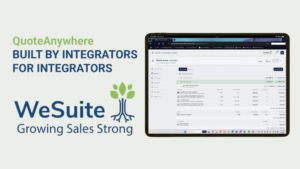Let's Talk About Sales Commissions
Calculating commissions driving you crazy? Let’s talk about how automating commissions increases profitable sales, commission accuracy, and produces happier salespeople!

By Tracy Larson
Between carrots and sticks, salespeople prefer carrots. Don’t we all?
Commissions are the ultimate carrot. For mediocre salespeople, well-structured commission plans keep them on task, prioritizing money-making sales activities. For the best salespeople, they provide generous and well-deserved compensation for hard work and exceptional performance.
WHY AUTOMATION IS SO IMPORTANT
Someone probably put a lot of thought into your company’s commission plans. They were designed with the best intentions. However, even the best plans need tweaking over time. Quotas shift, objectives change, and companies want to incentivize the sale of new products and services, sales within specific markets, to new customers, and recurring revenue sales – to name a few.
When companies calculate commissions manually, change isn’t easy. There’s a big gap between what companies want to do and what they can do. Often, plans are oversimplified neglecting to drive incentives to meet key objectives, or over complicated, making it extremely difficult to calculate and finalize payments on time. They tend to maintain the status quo to avoid upsetting the apple cart. Testing new models, defining new metrics, and implementing updated calculations is too daunting. These companies, and their salespeople, are stuck.
Not only are they stuck, but they’re unable to leverage the full impact of whatever commission structure is in place. With manual commissions, salespeople lack a real-time, transparent view of how their sales tactics affect their earnings. For example, they may offer a discount to close a deal without realizing how much the lower price reduces their commission. Or, they may skip including a maintenance plan because they don’t appreciate how much more they could earn by doing so. To work their magic, carrots should be dangling in front of salespeople’s noses, not stuffed in the bottom drawer of the fridge.
Finally, whatever manually-calculated commission plans these companies offer, they’re bound to be pretty darn simple. You want commission plans to be straightforward enough that everyone understands how they work, but also flexible, to drive key sales goals and reward the most profitable sales. Software makes flexibility possible.
Automating commissions allows for stacked rules, triggered by data in the sales process. For instance, rewarding self-generated leads at higher commission rates than company provided leads or, accommodating special situations – like limited-time promotions, or surpassing certain sales goals monthly. Plan rules that trigger calculations based on a sliding gross margin scale for outright sales and reward separately for recurring service sales, increasing payment based on longer contract terms drive profitability and earnings. Automation allows commissions to calculate visibly in sales, prompting salespeople to increase sales profitability for them and their company.
Everyone wins! Management wins by better aligning sales behaviors with growth objectives; resource time is saved; and salespeople win by being more effective and increasing sales. Think it’s time for your team to reap the benefits of sales automation? Reach out – we’re here to help!
HOW TO STRUCTURE COMMISSIONS
At WeSuite’s recent Summer Workshop, we heard from clients about how they’re structuring commissions for maximum effectiveness. Here’s what we learned:
Paying off the Gross Profit Margin (GPM): Most clients report using the GPM to calculate commission and require a margin of 25% or better. This encourages sales reps to make each job as profitable as possible.
If a company prefers to pay off actuals, bear in mind that profit margins may erode during delivery through no fault of the sales rep. If the job was estimated correctly, reviewed, and approved before being sent to the customer, is it fair to penalize the salesperson if inefficiencies occur at installation? Conversely, should the salesperson be paid more if the operations team nails it and delivers above the projected margin? Maybe not. For these reasons, paying off the estimate offers more fair compensation to the sales rep, as it directly reflects their contribution to the project. Even so, many companies prefer to pay off actuals. (WeSuite’s automated commissions use estimates.)
Be Consistent: Commission plans cannot vary between salespeople. When a salesperson discovers that the guy in territory 5B has a sweeter deal, everyone will want the same thing. It’s a recipe for poor morale. That doesn’t mean you can’t have different quotas based on a salesperson’s territory and experience. If someone has a less busy territory, it will be harder for them to close jobs. It’s only fair that their quota is lower.
Use percentages to define where multipliers go up and keep those consistent across the sales organization. At 25% of quota, all salespeople get X% commission. At 50%, they get Y. What those benchmarks represent in actual dollars will differ by individual quotas, but the system will be perceived as fair.
Incentive RMR: RMR has transformed the security business in the past decade. While business owners immediately recognized RMR as a golden goose, not all salespeople understand how much RMR sales contribute to profitability. Applying special commissions for RMR sales gets them onboard. For example, they might earn a much higher commission for selling a 5-year service agreement or licensing plan than a 3-year.
Gifts Are Good! Beyond commissions, many firms give bonuses to acknowledge exceptional circumstances. Giving money is old school. Personalized gifts – like golf clubs, theater tickets, or something related to a rep’s hobby or personal interest is better because it is something the recipient will appreciate and enjoy. By contrast, if they bring home a $500 bonus, they’ll likely use it to pay for car repairs or the kid’s orthodontia. No fun.
For younger workers, extra PTO is now the most coveted bonus. They would rather have an extra paid day off than receive an extra day’s pay. How times have changed!
Let Technicians Sell Too: Yes, technicians should be focusing on their primary role – installing and servicing systems that are already sold – but they’re also on the front lines, aware of where additional parts or services would benefit the customer. If, while onsite, they can install an extra camera that the customer requests or extend the service agreement, shouldn’t they be encouraged to do so and rewarded for their efforts with a commission? Taking care of the additional sale, on the spot, eliminates an extra trip out, immediately satisfies the customer, and makes the project more profitable.
The technician’s commission could be relatively low, given their higher base salary. Or, maybe they split the commission with the project’s salesperson for the parts they add. Either way, a carrot is a carrot, and with 200% of daily recommended Vitamin A, it offers plenty of nourishment to go around!
Have you made recent changes to your commission plan? Tell us why, how it’s working out, and whether you’re using software to automate the process.
Recent Post

WeSuite Expands Its QuoteAnywhere to a Full-Featured Stand-Alone Sales Platform
WeSuite, a manufacturer of award-winning sales management software for security technology sales and service providers, is excited to announce the expansion of its web-based sales software, QuoteAnywhere, to a full-featured, stand-alone, lead-to-close sales platform.

WeSuite President Tracy Larson Inducted into Security Sales & Integrations Industry Hall of Fame
WeSuite, a manufacturer of award-winning sales management software for security technology sales and service providers, announced today that Tracy Larson, WeSuite President and Co-Founder, has been inducted into the Security Sales & Integration’s Industry Hall of Fame.

Are You Getting the Most Out of Your CRM? Start by Asking these 5 Simple Questions
Your sales pipeline is your lifeline. It tells you where your deals stand, where your time should go, and how close you are to hitting your number. And your CRM? It’s the tool that keeps your pipeline in check.

Is There a Secret to Closing Security Sales Faster? Here Are Seven!
Pushy, high-pressure sales tactics turn off buyers – we’ve all been there! Fortunately, you can increase your on-the-spot close ratio by being buyer and solution oriented with sales automation software like QuoteAnywhere from WeSuite to support your sales efforts.
